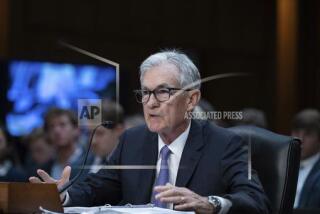Deflation Worries Are Over, Greenspan Says
- Share via
Federal Reserve Chairman Alan Greenspan said Tuesday that U.S. companies were regaining the power to raise prices and that a long period of worry about the potential for price deflation was over.
“It’s fairly apparent that pricing power is gradually being restored and ... threats of deflation, which were a significant concern last year, by all indications are no longer an issue for us,” Greenspan said in answer to questions from lawmakers before the Senate Banking Committee.
Greenspan said deflation concerns had evaporated in the last few weeks and called this a “long overdue and most welcome change” in the economic outlook.
Deflation, in which prices spiral downward, is a stubborn phenomenon rare in U.S. economic history that was last seen during the Great Depression.
Greenspan did not specifically say risks of inflation and deflation were balanced, though analysts increasingly expect Fed officials to reach that conclusion at their next policy session May 4.
Greenspan said fast growth in productivity, or hourly output per worker, should keep a lid on price pressures for some time. That gives the Fed some leeway to take its time in raising rates back to what economists call a “neutral” stance -- between 3% and 4% -- rather than being forced by surging price pressures to increase credit costs.
“The inflationary pressures will be reasonably well-contained so long as productivity is moving at a reasonably good clip and unit labor costs, as best as we can judge, are still going down,” Greenspan said.
He said the economy had weathered multiple shocks well in recent years, helped by 13 Fed interest-rate cuts. Greenspan indicated policymakers were ready to do whatever was necessary to keep expansion on track.
In his prepared testimony, Greenspan said he thought U.S. banks were well-positioned for higher interest rates. His formal remarks dealt exclusively with the banking industry but today he is scheduled to discuss the broader economic outlook before the congressional Joint Economic Committee.
More to Read
Inside the business of entertainment
The Wide Shot brings you news, analysis and insights on everything from streaming wars to production — and what it all means for the future.
You may occasionally receive promotional content from the Los Angeles Times.










